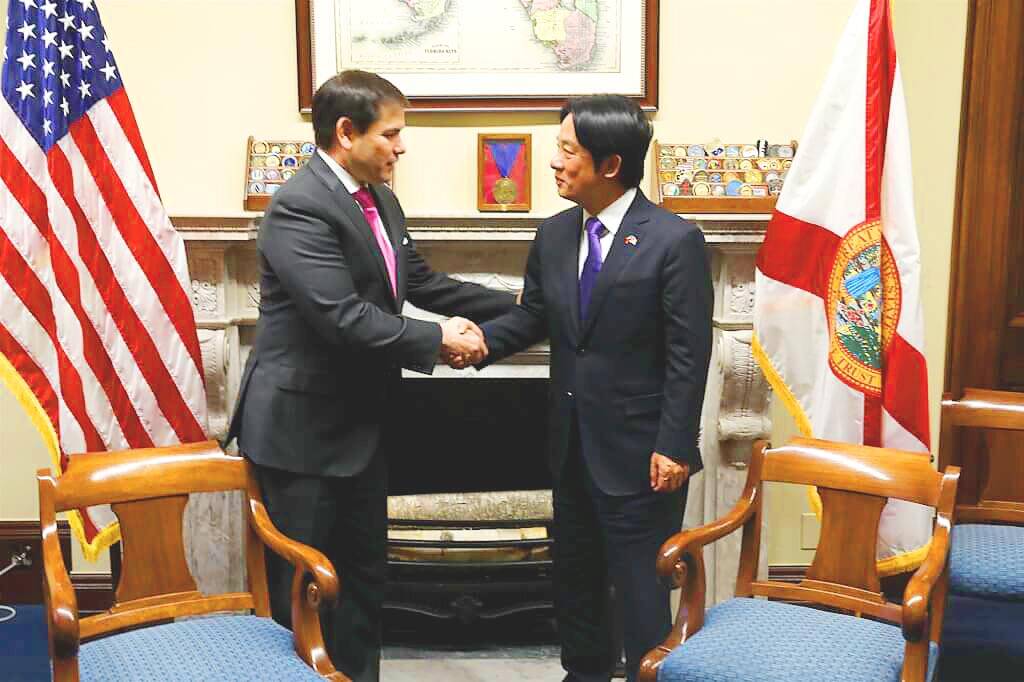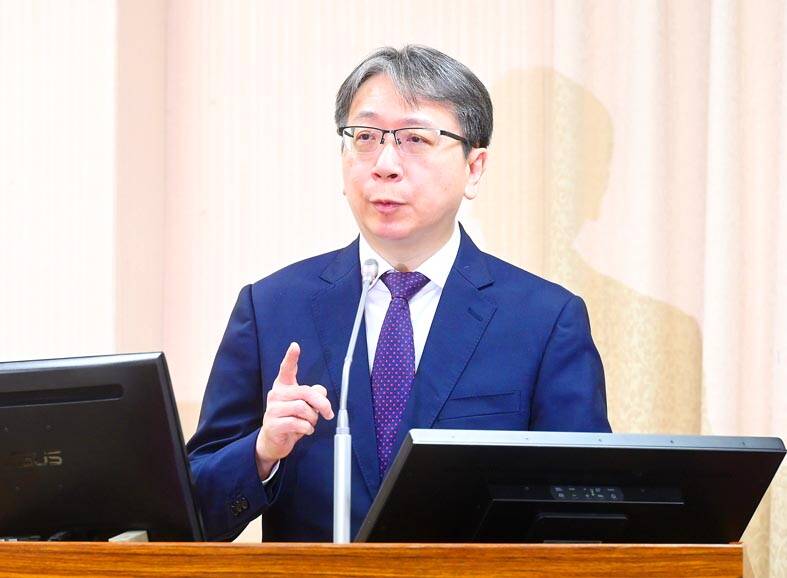US president-elect Donald Trump seems to be appointing senior national defense and diplomacy officials based on the principles of “America first” and “containing China,” National Security Bureau (NSB) Director-General Tsai Ming-yen (蔡明彥) said, without commenting on specifics.
The incoming Trump administration could propose a comprehensive strategy targeting Beijing, from geopolitics, economic decoupling, supply chain security and export restrictions, Tsai said on the sidelines of a legislative session in Taipei.
On Taiwan-US relations during Trump’s second presidency, Tsai said Taiwan would maximize the shared interests of both countries to continue promoting strategic cooperation.

Photo from Marco Rubio’s X
The main goal for Taipei would be to show Washington and the international community that it is an indispensable partner in terms of economics, trade and security; not someone that does nothing and “enjoys the fruits of other’s labor,” Tsai added.
He also said that the Taiwanese and US governments have enjoyed solid collaboration for decades.
The government has expressed its gratitude to outgoing US President Joe Biden for his support over the past four years and is looking forward to working with Trump for the next four years, Tsai said.

Photo: Wang Yi-sung, Taipei Times
Some of the top positions in Trump’s incoming administration are to be filled by figures known for their hawkish views on China, signaling a tough line on Beijing from national security to trade.
Trump has nominated US Senator Marco Rubio as his secretary of state and has picked US Representative Mike Waltz, a retired Green Beret and a China hawk, to be his national security adviser.
Rubio is known for his hardline policies on China and Iran. He has also proposed several Taiwan-friendly bills.
Meanwhile, senior security officials said that Taiwan does not have a “concrete list” of new arms deals to put to the incoming Trump administration, but is keen to discuss how to boost the nation’s defense.
Sources have previously said that Taiwan might place large new arms deals early in the next US administration to show that it takes seriously Trump’s comment that Taiwan should pay “protection” money.
Taipei is considering buying a big package of weapons from the US to demonstrate its commitment to self-defense, the Financial Times also reported this week.
“Currently, we do not have any such concrete list, but we welcome advice from all sides, with the most important thing being how to boost self-defense capacity,” a senior Taiwan security official told reporters in Taipei, speaking on condition of anonymity.
“Taiwan is very willing to discuss with all like-minded partners, especially the US, how to continue to reinforce Taiwan’s defense capacity,” the official said.
Taiwan already has an order backlog of about US$20 billion and last month announced an almost US$2 billion order for missile systems.
The nation’s total defense spending has jumped about 80 percent since the Democratic Progressive Party entered office in 2016, the official said.
“Our commitment to self-defense would only get stronger, not weaker,” the official said.
The government regularly holds discussions with major US parties and think tanks on whether the nation’s military hardware and software are effective enough to counter a hypothetical Chinese attack, another security official said on condition of anonymity due to the sensitivity of the matter.
Such discussions include whether Taiwan should massively boost the size of its drone fleet capable of striking high-value Chinese military assets, the second official said.
“Such reviews are normal,” they said, adding that Taiwan has not started a new round of arms talks with the US.
“There are a lot of discussions and recommendations. We welcome everything that is beneficial to boosting Taiwan’s defense,” they said.
Four years ago, President William Lai (賴清德), who was then vice president-elect, visited the US as a private guest, where he met with Rubio during the National Prayer Breakfast.
They talked about their meeting on a social media post afterward, with Lai saying that they discussed strengthening Taiwan-US relations and Taipei’s participation in global organizations.
Lai on X yesterday congratulated Rubio on his confirmation as US secretary of state.
He also thanked Rubio for his “staunch support for Taiwan and tireless efforts to defend freedom and human rights globally.”
“I look forward to furthering Taiwan-US relations to promote peace and prosperity,” Lai said.
Lai attended the National Prayer Breakfast along with then-Democratic Progressive Party legislator Hsiao Bi-khim (蕭美琴) — who became representative to the US in July that year — as “nongovernmental guests” in February 2020, a source familiar with the matter said yesterday.

A strong continental cold air mass is to bring pollutants to Taiwan from tomorrow, the Ministry of Environment said today, as it issued an “orange” air quality alert for most of the country. All of Taiwan except for Hualien and Taitung counties is to be under an “orange” air quality alert tomorrow, indicating air quality that is unhealthy for sensitive groups. In China, areas from Shandong to Shanghai have been enveloped in haze since Saturday, the ministry said in a news release. Yesterday, hourly concentrations of PM2.5 in these areas ranged from 65 to 160 micrograms per cubic meter (mg/m³), and pollutants were

Taiwan’s armed forces have established response protocols for a wide range of sudden contingencies, including the “Wan Chun Plan” to protect the head of state, the Ministry of Defense (MND) said today. After US President Donald Trump on Saturday launched a series of airstrikes in Venezuela and kidnapped Venezuelan President Nicolas Maduro, concerns have been raised as to whether China would launch a similar “decapitation strike” on Taiwan. The armed forces regularly coordinate with relevant agencies and practice drills to ensure preparedness for a wide range of scenarios, Vice Minister of National Defense Hsu Szu-chien (徐斯儉) told reporters before a

EVA Airways on Saturday said that it had suspended a pilot and opened an investigation after he allegedly lost his temper and punched the first officer several times as their plane was taxiing before takeoff at Los Angeles International Airport. According to a report published on Thursday by The Reporter, the incident occurred after the flight’s Malaysian first officer tried to warn the Taiwanese pilot, surnamed Wen (文), that he was taxiing faster than the speed limit of 30 knots (55.6kph). After alerting the pilot several times without response, the first officer manually applied the brakes in accordance with standard operating

Japanese Councilor Hei Seki (石平) on Wednesday said that he plans to visit Taiwan, saying that would “prove that Taiwan is an independent country and does not belong to China.” Seki, a member of the Japan Innovation Party, was born in Chengdu in China’s Sichuan Province and became a naturalized Japanese in 2007. He was elected to the House of Concilors last year. His views on the Chinese Communist Party (CCP) — espoused in a series of books on politics and history — prompted Beijing to sanction him, including barring Seki from traveling to China. Seki wrote on X that he intends